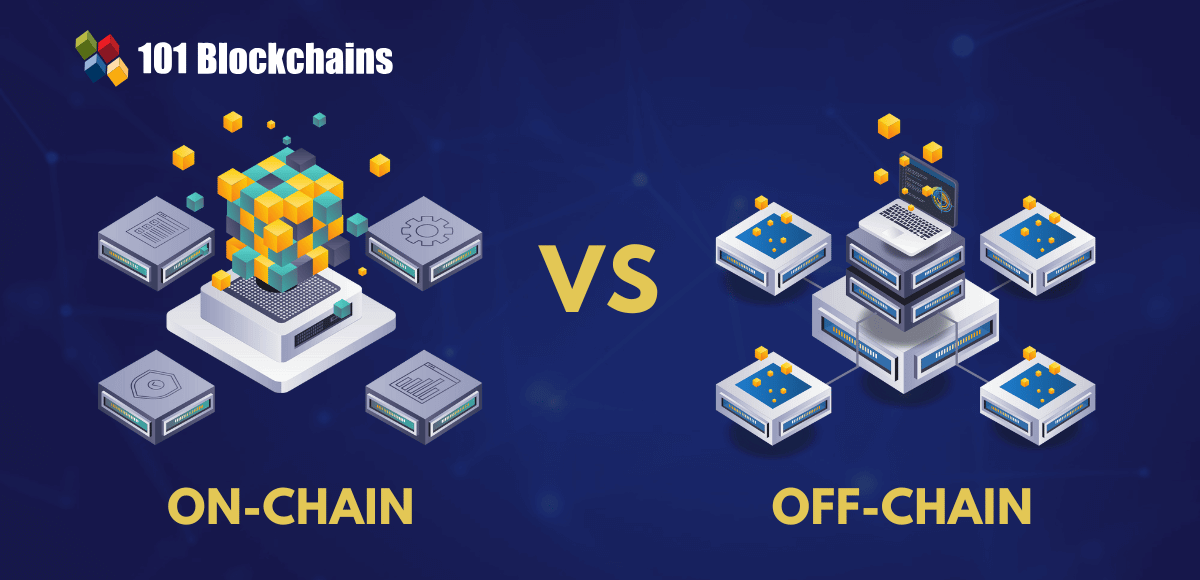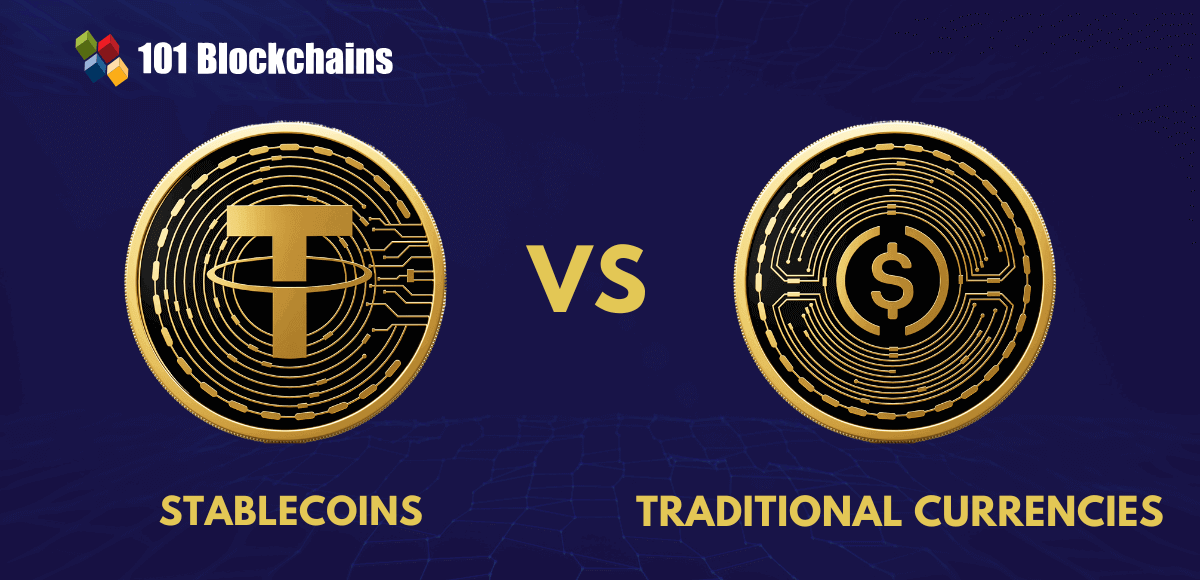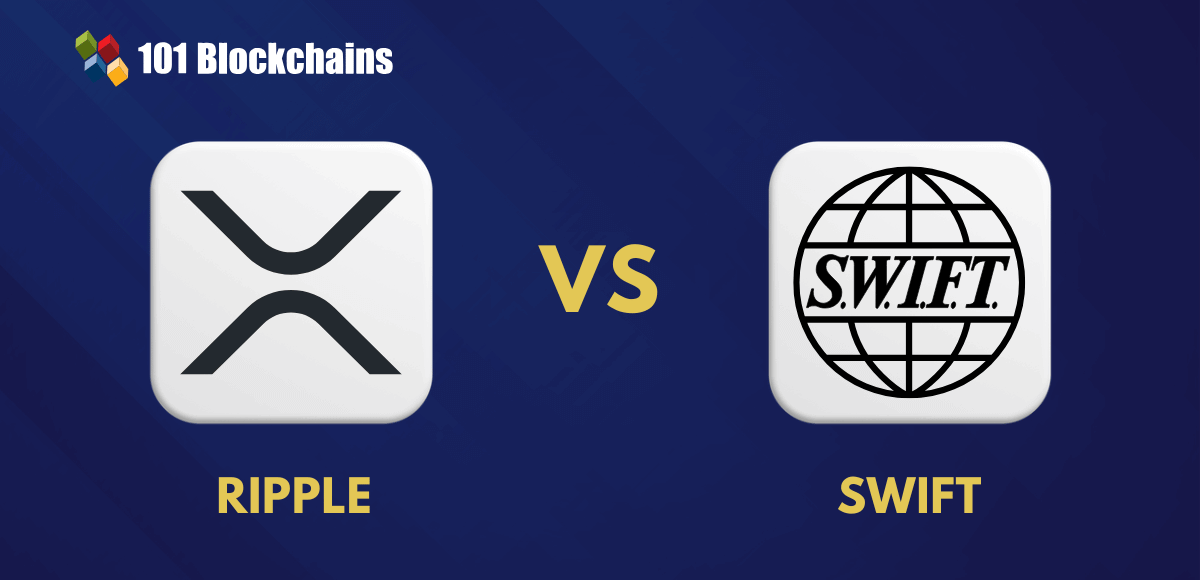Learn how blockchain truly works, master key definitions, and uncover what makes smart contracts so "smart." Dive into the fundamentals, gain valuable insights, and start your blockchain journey today!
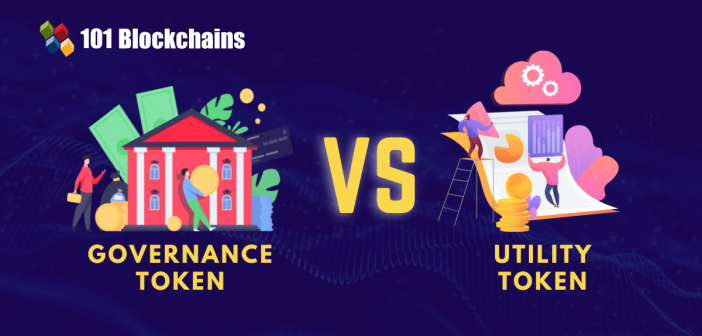
- Comparisons
James Howell
- on September 28, 2022
Governance Token vs Utility Token – Key Differences
Blockchain technology has spurred a new wave of change and favorable possibilities for the future with many innovative advancements. The examples of DeFi and digital ownership in NFTs, alongside many other innovative products, platforms and services, showcase the power of blockchain. The use of blockchain in tokenization has opened up new models for defining organizations and ownership of assets. Therefore, the governance token vs utility token debate bears significant weight in context of the rapid growth in mainstream uses of blockchain.
Governance tokens and utility tokens both of them are integral highlights in the world of blockchain and would play a significant role in the future of the web3 ecosystem. How are governance tokens and utility tokens different from each other? The following discussion will help you find the answer with a detailed assessment of each type of token.
Build your identity as a certified blockchain expert with 101 Blockchains’ Blockchain Certifications designed to provide enhanced career prospects.
What are Governance Tokens and Utility Tokens?
The onset of tokenization in the world of crypto alongside the arrival of DAOs, DeFi and NFTs led to attention to functions of different types of tokens. As a matter of fact, the utility token vs governance token comparison has gained prominence in recent times. The different products, platforms and new solutions emerging from tokenization and new developments in crypto have called for attention to tokens. Interestingly, you can find better scope for comparing governance tokens and utility tokens by understanding both of them in detail.
Governance Tokens

The development of new solutions and platforms on the foundations of decentralization has massive communities at the core. Tokenization has unlocked many new models for defining the structure of organizations and proof of ownership. The communities underlying the new blockchain-based solutions have people from different parts of the world with different skills and backgrounds. The global communities want to explore and develop innovative ideas alongside exchanging value.
At the same time, the communities face challenges associated with coordination, decision making and, most important of all, governance tokens. The difference between governance and utility token would profoundly emphasize the primary role of governance tokens. Let us learn more about governance tokens to prepare an effective comparison with utility tokens.
Governance tokens, as the name implies, serve as the representatives of voting rights and ownership in decentralized protocols. The owners of governance tokens have complete rights over influencing the future direction of a protocol. For example, governance tokens can help in representing rights over voting for spending budgets, new partnerships or addition of new features. Governance tokens are an integral component for decision-making in DAOs or decentralized autonomous organizations, which do not have a clearly defined leadership.
Start learning Blockchain with World’s first Blockchain Career Paths with quality resources tailored by industry experts Now!
Working of Governance Tokens
The answers to “What is the difference between a utility token and a governance token?” would also point you towards the working of governance tokens. In the case of traditional business models, organizations featured shareholders, executives and a board of directors taking control over decisions about the organization’s future direction.
Decentralized Autonomous Organizations or DAOs do not concentrate the decision-making power in a centralized group. On the contrary, DAOs make their decisions through a specifically designed governance process with community votes and proposals. Irrespective of the governance models followed in DAOs; governance tokens are the common element in all of them.
The governance tokens feature certain distinct traits which come with the existence of blockchain. You can notice that the governance tokens come with immutable ownership alongside transparent distribution. As a result, governance tokens serve as the perfect choice for decentralized decision-making. The governance token vs utility token difference can become clearer when you notice how governance tokens are put to use.
Any member or a group of members on a DAO could pass a proposal for voting, and governance token owners can exercise their vote. It is also important to note that the voting power of a governance token holder is directly proportionate to the number of tokens in their ownership. On the other hand, you can also find certain DAOs which use unique voting mechanisms like quadratic voting to ensure equitable voting power.
Want to learn blockchain technology in detail? Enroll Now in Certified Enterprise Blockchain Professional (CEBP) Course
Special Highlights of Governance Tokens
The next important aspect about governance tokens you would need in a utility token vs governance token comparison refers to the special highlights of governance tokens. Interestingly, governance tokens can be considered as a type of utility token. Before you dive deeper into the details of utility tokens, you must know that they offer access to products or services associated with the protocol.
Utility tokens can also provide the privilege of exercising special rights. In the case of governance tokens, the special rights would refer to the rights for influencing the future direction of a protocol. Many DeFi protocols, such as Compound and Uniswap, have shown how their utility tokens took up the responsibilities of governance tokens.
In a way, you can think of governance tokens as the primary utility token for DeFi protocols. On top of it, governance tokens can also serve as the predecessors for true decentralization. However, the thin line of difference between governance and utility token separates both types of tokens on the basis of voting rights. Governance tokens feature voting power on a specific blockchain network or decentralized protocol.
Governance tokens are significantly different from utility tokens in the fact that they empower users with ownership and control over the concerned platform or protocol. Furthermore, some protocols incorporate special traits and privileges with governance tokens, which could ensure promising benefits for the token holders.
Want to learn and understand the scope and purpose of DeFi? Enroll Now in Introduction to DeFi- Decentralized Finance Course
Challenges with Governance Tokens
The search for answers to “What is the difference between a utility token and a governance token?” would also require attention to the challenges associated with governance tokens. Voting rights, control and ownership of protocols and special privileges can be welcoming signs about governance tokens. However, you should also notice the other crucial setbacks evident with governance tokens.
- Governance tokens have to come up with fair and transparent distribution mechanisms to avoid exploitation of voting privileges by whales. DAO projects need fair launches to ensure proper distribution of governance privileges to all users.
- Governance tokens must be locked in for longer periods of time and do not allow the owner to extract any value from them. Furthermore, the supply fluctuations after the vesting period could affect the power of governance tokens in voting rights.
- The governance token vs utility token comparison must also account for regulatory uncertainty in the case of governance tokens. Regulators have not come up with a distinctive stand on cryptocurrencies, thereby placing governance tokens under uncertainty.
Want to become a Cryptocurrency expert? Enroll Now in Cryptocurrency Fundamentals Course
Utility Tokens

The word cryptocurrency has been used frequently for describing almost any type of digital asset. However, you would find many unique assets, such as utility tokens which are a lot different than what you would expect with cryptocurrencies. Utility tokens are a special type of crypto token designed for serving a particular use case in a concerned ecosystem. Basically, utility tokens grant the rights to users to perform some actions on a specific blockchain network or decentralized application. The utility token vs governance token difference finds better clarity in the definition of utility token and its primary objective.
It is also important to note that utility tokens are unique for the concerning ecosystems. For example, Basic Attention Token or BAT on the Brave Browser serves as a unique utility token. BAT can be useful only for tipping content creators through Brave browser or other applications featuring BAT wallets. You must also understand that BAT does not have any other use other than speculations for its value, just like other utility tokens. Furthermore, utility tokens are pre-mined, created in a particular quantity and distributed accordingly by the team underlying the project.
Working of Utility Tokens
The basic definition of utility tokens provides a strong foundation for differentiating from governance tokens. However, the difference between governance and utility token would be incomplete without understanding how utility tokens work. The owners of utility tokens receive special rights, such as the right to use or claim ownership of a product or service.
The utility associated with utility tokens can also help the owners pass proposals or exercise their voting rights for specific topics. Ownership of utility tokens also guarantees the benefit of decentralized storage, with the assurance of exchange value for the services offered by them. Utility tokens also work to improve the user experience through facility of rewards for special actions. For example, utility tokens can grant access to exclusive decentralized or blockchain-based services.
Challenges Associated with Utility Tokens
The discussions on “What is the difference between a utility token and a governance token?” would also draw you towards the challenges associated with utility tokens. A clear overview of the challenges for utility tokens could help in ensuring that you have a better understanding of the differences between them.
Utility tokens have been hailed as favorable instruments for achieving profits and obtaining finances for new emerging projects. On the other hand, utility tokens also present a variety of risks. The ICO boom of 2017 played a vital role in driving the popularity of utility tokens. The widespread use of utility token mechanisms shot them to popularity while also playing a central role in their downfall.
Utility tokens have been frequently associated with concerns of trust issues alongside the necessity for constant audits in new projects. Most of the utility tokens had been designed with unrealistic goals. Another significant deterrent for utility tokens emerges in the form of limited regulation. Utility tokens have to depend on the project contributing any real utility to the users as they don’t have any inherent mechanism for increasing value.
If the project fails, then the utility tokens will lose value. The difference between governance and utility token is also evident in how utility token owners do not have any power in decision-making. Utility tokens can also run the risk of liquidity problems if the project cannot gather the required capital for development purposes. Furthermore, utility tokens do not play any role in driving cryptocurrency adoption as they focus on special perks within the concerned crypto ecosystem.
Learn Blockchain concepts easily with Blockchains flashcards.
Differences between Governance Tokens and Utility Tokens
The detailed assessment of each type of token provides an overview of the differences between governance tokens and utility tokens. Here is an outline of the differences between governance and utility tokens on the basis of different factors.
Here is an overview of the difference between governance tokens and utility tokens in the form of a table.
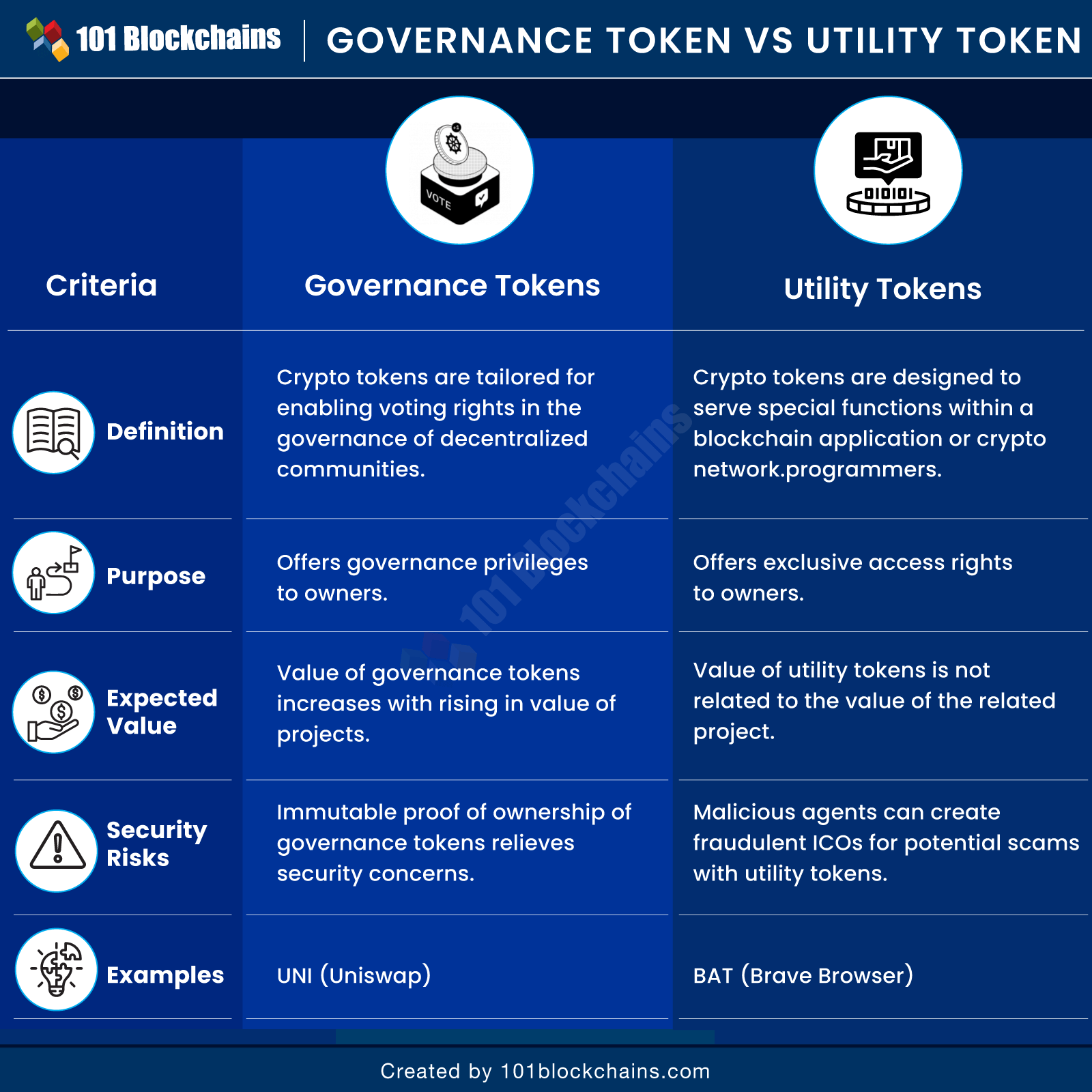
Please include attribution to 101blockchains.com with this graphic. <a href='https://101blockchains.com/blockchain-infographics/'> <img src='https://101blockchains.com/wp-content/uploads/2022/09/Governance-Token-vs-Utility-Token-1.png' alt='Governance Token vs Utility Token='0' /> </a>
-
Objectives
The most noticeable highlight in a governance token vs utility token difference is the objective of the tokens. Governance tokens represent the voting rights of the token owner in a specific community, such as DAOs. Utility tokens represent the rights to exclusive products, services or experiences on the concerned network.
-
Expected Value
The value of governance tokens depends directly on the projects they correspond to. On the other hand, utility tokens do not have any direct relation to the company’s estimated valuation at the concerned time.
-
Security Risks
Governance tokens feature the assurance of exclusive ownership, and it is difficult to compromise the proof of ownership of governance tokens. On the other hand, scammers can create fraudulent ICOs and come up with utility tokens for the sole purpose of compromising the user’s assets.
Start learning Blockchain with World’s first Blockchain Skill Paths with quality resources tailored by industry experts Now!
Final Words
The detailed outline of differences in a utility token vs governance token comparison shows that governance tokens have the upper hand. Utility tokens are basically any type of crypto token you can release with a specific decentralized application or crypto ecosystem for performing specific actions. Therefore, you have a limited scope for the things you can try out with utility tokens. On the other hand, governance tokens put the power to transform a protocol or the decentralized ecosystem itself. Learn more about governance tokens and utility tokens in detail.
*Disclaimer: The article should not be taken as, and is not intended to provide any investment advice. Claims made in this article do not constitute investment advice and should not be taken as such. 101 Blockchains shall not be responsible for any loss sustained by any person who relies on this article. Do your own research!



